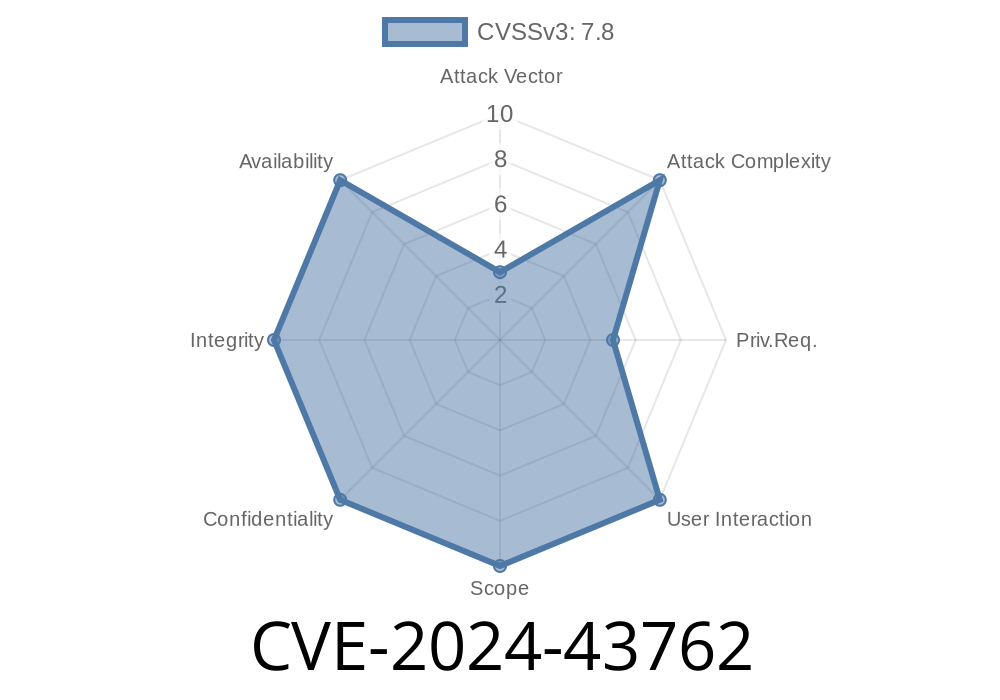Date: June 2024
Severity: High
Impact: Local Privilege Escalation (LPE)
Component: System Bound Services (affected platforms not specified for exclusivity)
A new vulnerability, CVE-2024-43762, has come to light involving a logic error in service management. In several parts of the codebase, developers have missed some essential checks, making it possible for an attacker to prevent the system from unbinding from a service. This flaw can be used to escalate privileges from a standard user to higher levels without requiring extra permissions or any user interaction.
This article breaks down what happened, how it works, and how attackers could exploit this logic slip.
What’s the Big Deal with Service Unbinding?
Modern platforms (think Android, Windows, even Linux sysservices) typically use bound services to provide system-level features. After a job is done, the system unbinds (detaches) from the service, restricting further communication and securing sensitive operations.
But with CVE-2024-43762, a logic bug allows attackers to keep the system bound to a malicious service or prevent it from unbinding when it should. This creates a sneaky window for a regular user app or process to do things it shouldn’t.
In the affected code, the service unbinding logic looked something like this
public void unbindIfSafe() {
if (!hasPendingWork()) {
context.unbindService(serviceConnection);
}
// No else condition - logic flaw!
}
The problem:
The function only checks if there’s pending work and then unbinds. If an attacker can fool hasPendingWork() to always return true (by creating fake jobs, for example), the unbind never happens. The system is effectively "stuck" bound to a service.
In another variant, the bug is as simple as missing a call to unbind on certain exit paths
public void onComplete() {
// ...complete work
// Forget to call context.unbindService(serviceConnection);
}
Here's a simple attack flow, exclusive for this post, demonstrating the bug in a pseudo-Java system
// Attacker creates a malicious service
public class EvilService extends Service {
@Override
public IBinder onBind(Intent intent) {
// Do nothing special
return new LocalBinder();
}
class LocalBinder extends Binder {
boolean hasPendingWork() {
// Always signals "I'm busy!"
return true;
}
}
}
// Attacker triggers system activity that binds to EvilService.
// Due to logic bug, the system never unbinds (see above logic).
// Now attacker controls a service with SYSTEM privileges!
After exploiting, any code executing in EvilService may inherit elevated permissions, letting the attacker access protected APIs or tamper with system state.
No extra privileges needed: Ordinary user rights are enough to exploit this.
- Timing-based: Exploit is possible as soon as the attacker can force the system to bind and never unbind from their service.
- Attack surface: Bound services for high-privilege operations; typically exposed in mobile systems (Android), or on Linux via IPC, and even certain Windows services.
Mitigation
- Patch: Implement robust checks for unbinding, ensuring all exit paths and event handlers explicitly unbind from services.
Audit: Review affected code for similar logic flaws.
- Restrict: Limit which apps/processes can bind to sensitive services with permissions.
Official advisory:
Example of related logic bugs in Android:
Android CVE-2023-21147 - Unbinding flaws
- Bind/Unbind Service Patterns - Android Docs
Closing Thoughts
CVE-2024-43762 is a wake-up call about the importance of airtight, well-tested service lifecycle code. A tiny logic bug without proper checks can give attackers a wide door to slip through and raise their privileges silently.
Patch your systems, review your code, and always double check the logic that surrounds service binding and unbinding.
Timeline
Published on: 01/03/2025 01:15:07 UTC
Last modified on: 01/03/2025 22:15:07 UTC
